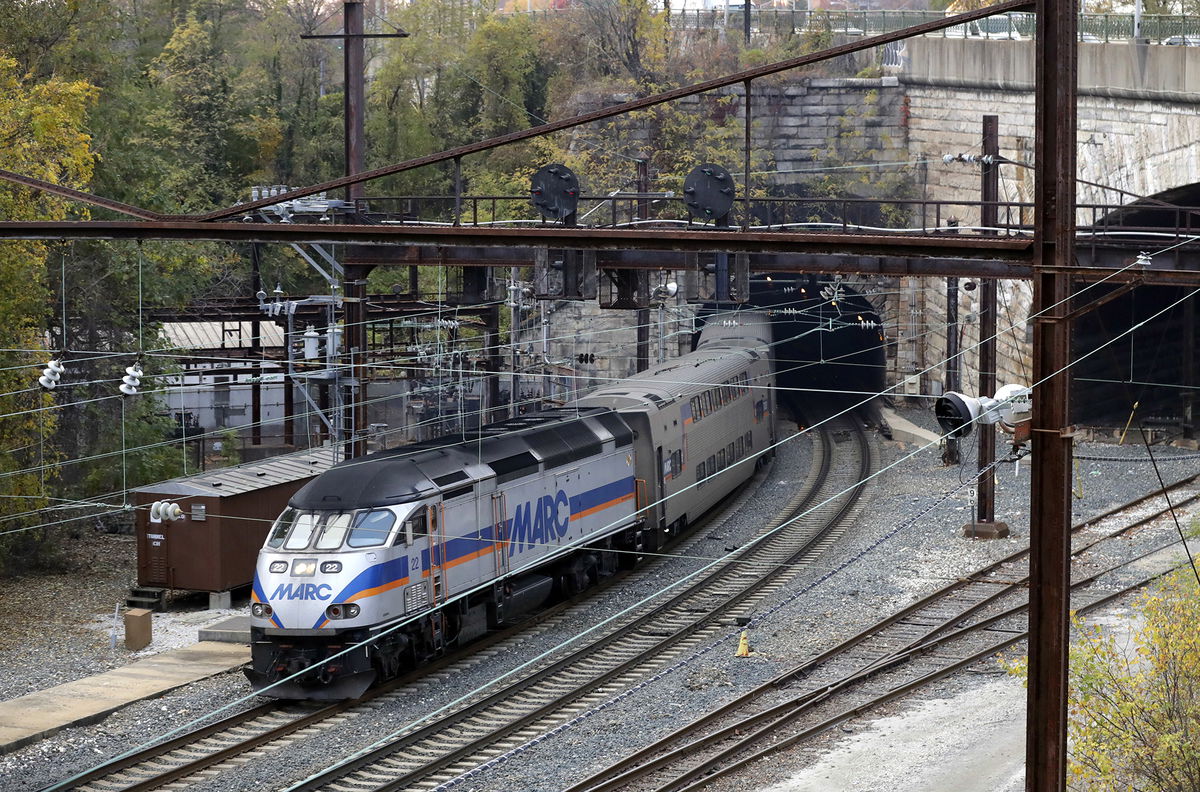Century-old train tunnels in Baltimore and New York to get funding from Biden’s infrastructure law

Long-needed improvements are coming to train travel along the nation’s busy Northeast Corridor
By Katie Lobosco, CNN
Long-needed improvements are coming to train travel along the nation’s busy Northeast Corridor, thanks in part to the federal infrastructure funding package that President Joe Biden signed into law in the fall of 2021.
The president is making two big funding announcements this week to address bottlenecks at century-old train tunnels in Baltimore and New York City — two projects that have struggled for years to acquire enough money to get off the ground.
Construction is expected to begin as early as this year, though completion is years away.
Baltimore and Potomac tunnel
In Maryland, the 150-year-old Baltimore and Potomac tunnel will be replaced with two new tubes for Amtrak and Maryland Area Regional Commuter (MARC) trains.
Running under densely populated West Baltimore, the 1.4-mile tunnel is the oldest on the Northeast Corridor rail line and the only way for certain trains to travel south from Baltimore’s Penn Station to Washington, DC, and Virginia.
More than 10% of weekday trains are delayed, according to Amtrak. Tight curves in the tunnel currently require trains to slow down to speeds of 30 miles per hour. The tunnel also suffers from a variety of age-related issues, such as excessive water infiltration, a deteriorating structure and a sinking floor.
The improvements are expected to nearly triple capacity in the tunnel and soften the curves, allowing trains to travel as fast as 110 miles per hour. There are also plans for new signaling systems, five new roadway and railroad bridges in the area surrounding the tunnel, and a new West Baltimore MARC station that’s Americans with Disabilities Act-accessible.
The White House said Monday that the project could get up to $4.7 billion in funding from the infrastructure law. Maryland’s transportation agency has committed $450 million. In total, the new tunnel project is expected to cost around $6 billion.
The project previously received $44 million through a 2009 federal stimulus package called the American Reinvestment and Recovery Act for preliminary engineering and permitting. But it had lacked a viable funding source to continue construction.
The new tunnel will be named after Maryland native and abolitionist Frederick Douglass.
Hudson River tunnel
Roughly 200,000 passengers make trips on either Amtrak or New Jersey Transit trains that run between New York and New Jersey under the Hudson River each weekday.
First opened in 1910, the tunnel has several age-related problems and also suffered damage when Hurricane Sandy inundated the tubes with salt water in 2012.
Still in early stages, the most recent plans call for the construction of a new rail tunnel beneath the Hudson River and then rehabilitation of the existing tunnel, known as the North River Tunnel.
In 2019, New York and New Jersey created the Gateway Development Commission to help facilitate the project. Last year, the commission estimated it could cost $16.1 billion and anticipated a 2038 completion date.
Funding sources are still being determined, but are expected to include federal, state, local and possibly private funding.
Former New Jersey Gov. Chris Christie killed an earlier version of the plan to build a new tunnel in 2010.
The White House said Tuesday that Amtrak, which owns the tunnel, will receive a $292 million grant from the infrastructure law to help complete construction of concrete casing underground on the Manhattan side of the river. The concrete casing will protect the path of the new tunnel from the Hudson River’s edge to New York’s Penn Station.
If this casing is not built now, the White House said, the foundations from the new Hudson Yards development would likely impede the path of the tunnel and make the project extremely difficult.
How the infrastructure law works
The $1.2 trillion federal infrastructure package was signed into law in November 2021 after receiving bipartisan support in Congress. It will provide roughly $550 billion of new federal investments over five years for everything from bridges and roads to the nation’s public transit, broadband, water and energy systems.
The funds are delivered in two ways: through formula programs that send money directly to states and through competitive grant programs that require state and local agencies to apply.
A lot of the formula programs have long been sending federal money to states on an annual basis but are now delivering much more funding for the five-year period covered by the infrastructure law.
For example, the Federal Highway Administration released nearly $60 billion to states last year through 12 formula programs to support investment in roads, bridges and tunnels; carbon emission reduction; and safety improvements. That’s an increase of $15.4 billion compared with fiscal year 2021, the last fiscal year before the infrastructure law was implemented.
Dozens of major, specific projects have been selected for funding through grant programs over the past year. Funding for the Infrastructure for Rebuilding America grant program (known as INFRA), which is meant for freight and highway projects of national or regional significance, increased by more than 50% last year. About $1.5 billion was released for 26 transportation projects in September.
In August, the Rebuilding American Infrastructure with Sustainability and Equity program, known as RAISE, released $2.2 billion for 166 specific road, bridge, transit, rail, port or intermodal transportation projects across the country. In 2021, the program could only afford to fund 90 projects.
The infrastructure law also created new funding programs, like the National Electric Vehicle Infrastructure Formula Program, which released $615 million to states last year. That money can be used for installing public electric vehicle charging stations.
This story has been updated with additional information.
The-CNN-Wire
™ & © 2023 Cable News Network, Inc., a Warner Bros. Discovery Company. All rights reserved.